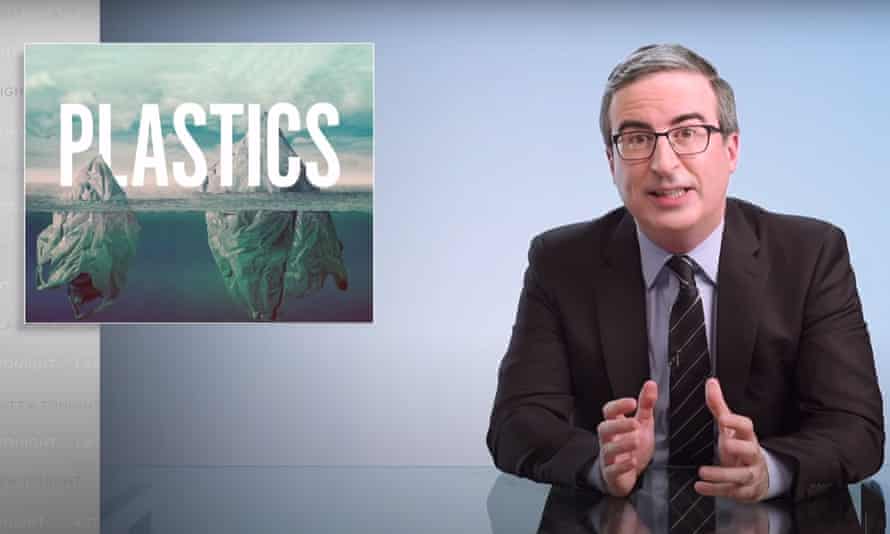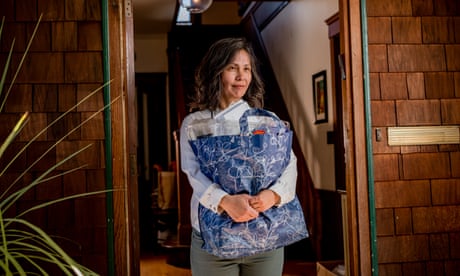John Oliver on plastics pollution: 'Our personal behavior is not the main culprit'
The Last Week Tonight host addresses the plastics industry-fueled myth that recycling works

John Oliver on plastic pollution and recycling: ‘Our personal behavior is not the main culprit here, despite what the plastics industry has spent decades and millions of dollars trying to convince us.’ Photograph: YouTube
Oliver’s main segment, however, unpacked the scourge of plastic pollution and the industry-fueled myth of recycling. Despite the omnipresence of the chasing arrows recycling symbol, the vast majority of plastic is neither recycled nor recyclable. Instead, it clogs up landfills, dumps and oceans, permeating our food intake – one study estimated that humans ingest a credit card’s worth of micro-plastic every week. “Which kind of explains Capitol One’s new slogan: what’s in your stomach?” Oliver joked.
Oliver dug into the history of plastic production, and how manufacturers have peddled the idea, under the guise of environmentalism, that “it’s up to you, the consumer, to stop pollution”, he said. “That has been a major throughline in the recycling movement often bankrolled by companies who wanted to drill home the message that it is your responsibility to deal with the environmental impact of their products.”
This message is epitomized by the national myth around recycling’s effectiveness; despite knowing that most plastic – over 90% – can’t be recycled, the industry lobbied state legislators to require the chasing arrows recycling symbol to be placed on all their products, and encouraged local governments to establish curbside recycling programs. “Honestly, it wasn’t all that difficult for them to convince us that all their waste is recyclable, because we so badly want to believe it,” Oliver said. “Lies go down easier when you want them to be true.”

Americans' plastic recycling is dumped in landfills, investigation shows
The truth, Oliver said, is that most US plastic waste was sold to China until it banned plastic imports in 2018; now it languishes in domestic dumps or toxic landfills in countries such as Myanmar, as well as in the ocean. And the scale is staggering: by 2050, there will be more plastic by weight than fish in the ocean; the giant garbage patch in the Pacific is now larger than France, Germany and Spain combined.
Yet “frustratingly, the plastic industry’s response to all the damage you’ve seen is to make a big show of tiny improvement and then revert to what they’ve always done, which is heavily push the idea that if we as consumers simply tried hard enough, we could make our plastic problem go away,” said Oliver. But “our personal behavior is not the main culprit here, despite what the plastics industry has spent decades and millions of dollars trying to convince us.”

Oliver advocated for thoughtful, targeted bans of single-use plastics (bags and takeout containers), and extended producer responsibility (EPR) laws that would shift responsibility and the costs of collection from the public sector to the actual producers of plastic waste.
The US is one of the few developed countries without an extended producer responsibility law for plastic – “because, of course it is”, Oliver said – though the Break Free from Plastic Pollution Act will be introduced to Congress again soon. As plastic production is expected to triple by 2050, “we will need some version of an EPR law to pass, and soon,” he said.
“The real behavior change has to come from plastics manufacturers themselves,” Oliver concluded. “Without that, nothing significant is going to happen.”
Oliver’s main segment, however, unpacked the scourge of plastic pollution and the industry-fueled myth of recycling. Despite the omnipresence of the chasing arrows recycling symbol, the vast majority of plastic is neither recycled nor recyclable. Instead, it clogs up landfills, dumps and oceans, permeating our food intake – one study estimated that humans ingest a credit card’s worth of micro-plastic every week. “Which kind of explains Capitol One’s new slogan: what’s in your stomach?” Oliver joked.
Oliver dug into the history of plastic production, and how manufacturers have peddled the idea, under the guise of environmentalism, that “it’s up to you, the consumer, to stop pollution”, he said. “That has been a major throughline in the recycling movement often bankrolled by companies who wanted to drill home the message that it is your responsibility to deal with the environmental impact of their products.”
This message is epitomized by the national myth around recycling’s effectiveness; despite knowing that most plastic – over 90% – can’t be recycled, the industry lobbied state legislators to require the chasing arrows recycling symbol to be placed on all their products, and encouraged local governments to establish curbside recycling programs. “Honestly, it wasn’t all that difficult for them to convince us that all their waste is recyclable, because we so badly want to believe it,” Oliver said. “Lies go down easier when you want them to be true.”

Americans' plastic recycling is dumped in landfills, investigation shows
The truth, Oliver said, is that most US plastic waste was sold to China until it banned plastic imports in 2018; now it languishes in domestic dumps or toxic landfills in countries such as Myanmar, as well as in the ocean. And the scale is staggering: by 2050, there will be more plastic by weight than fish in the ocean; the giant garbage patch in the Pacific is now larger than France, Germany and Spain combined.
Yet “frustratingly, the plastic industry’s response to all the damage you’ve seen is to make a big show of tiny improvement and then revert to what they’ve always done, which is heavily push the idea that if we as consumers simply tried hard enough, we could make our plastic problem go away,” said Oliver. But “our personal behavior is not the main culprit here, despite what the plastics industry has spent decades and millions of dollars trying to convince us.”

Oliver advocated for thoughtful, targeted bans of single-use plastics (bags and takeout containers), and extended producer responsibility (EPR) laws that would shift responsibility and the costs of collection from the public sector to the actual producers of plastic waste.
The US is one of the few developed countries without an extended producer responsibility law for plastic – “because, of course it is”, Oliver said – though the Break Free from Plastic Pollution Act will be introduced to Congress again soon. As plastic production is expected to triple by 2050, “we will need some version of an EPR law to pass, and soon,” he said.
“The real behavior change has to come from plastics manufacturers themselves,” Oliver concluded. “Without that, nothing significant is going to happen.”
No comments:
Post a Comment